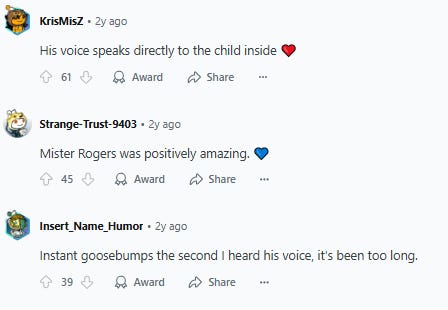🏡The Anchor Oddball🏡
Fred Rogers story pt. 1
New to Oddballs? Sign up here.
One of the hardest things to capture about any oddball is all of the equally strange people who influenced them.
It’s like covering a relay race and only discussing the training regimen of the anchor runner.
There’s rarely a thorough record of the contributions from grandparents, neighbors, or teachers. These people get a single sentence buried in the middle of a 500-page biography if they’re mentioned at all.
But their influence is profound. Many of the oddest of oddballs swam against the current because they had seen it done before.
The Odd Neighbor
The legendary children’s TV personality Fred Rogers is a great example of an oddball birthed by oddballs.
His children’s show, Mister Rogers’ Neighborhood, ran for 33 years influencing generations of children with his slow-paced and consistent message of unconditional care. He ended each episode with a version of this message: You've made this day a special day by just your being you. There's no person in the whole world like you, and I like you just the way you are.
Rogers discussed the importance of acknowledging feelings and mental health, decades before it was a cultural talking point. He was a model of kindness and empathy for millions of kids and parents. If you didn’t grow up in the era of Mister Rogers’ Neighborhood, read comments on any of Fred Rogers’ commencement addresses and interviews to get a sense of his impact.
Whenever there’s a natural disaster, attack, or other crisis, people return to Rogers’ advice to look for the helpers whenever there’s a tragedy because if you look for the helpers, you’ll know there’s hope.
The Odd Family
Fred Rogers’ approach to life and children’s TV was heavily influenced by his family. Some of his most famous lines were first said to him as a child.
It was his mother who advised him to look for the helpers to find hope when he would see a catastrophe in a movie or on the news. Did you grow up with anyone who communicated the concept of hope so succinctly and memorably?
His maternal grandfather used to tell him, “You’ve made this a special day Freddy by just your being yourself. There’s only one person in the world like you.” This was the 1930s or 40s. How many grandfathers born in the 19th Century do you think were dropping lines like that?
Rogers was a sensitive soul. He felt deeply. When something moved him, he didn’t easily forget it. As much as anything, this was the superpower that defined him. It allowed him to see the good and hold onto it tightly.
Odd Taste
The first time Rogers saw his father cry was when his grandfather died. When Rogers’ father died, he cried, “...and way down deep I knew he would have said it was all right.” Seeing his father cry helped him to know it was okay for men to cry.
It would have been just as easy to look at the lifetime his father spent holding it in and think he needed to be a strong example for his family. Would you blame him for feeling a twinge of shame at crying in public over his father’s death? He could have just as easily justified “manning up” and sitting stoically throughout the funeral. Instead, he remembered a single moment when his father was vulnerable and allowed that moment to define his understanding of his father and what he would want to see in his son.
Fred Rogers didn’t just have good examples to follow, he saw the good in everyone, and in doing that, everyone became a good example to follow.
Oddballs aren’t superheroes destined to change history with special powers or unique perspectives bestowed upon them at birth. They merely have good taste when it comes to choosing what heroes they create.
Sources
The Good Neighbor: The Life and Work of Fred Rogers by Maxwell King
The World According to Mister Rogers: Important Things to Remember by Fred Rogers











